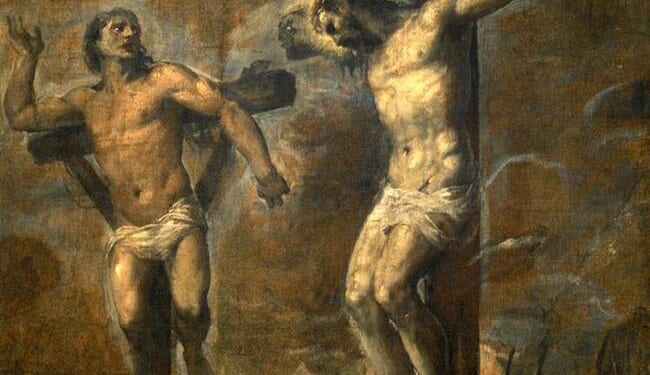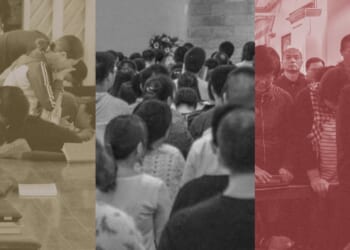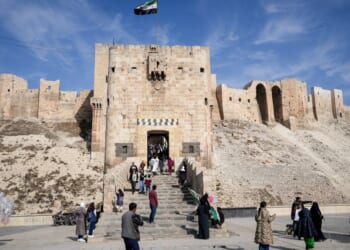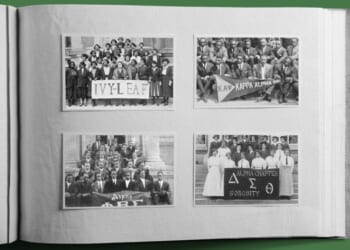
This morning’s Gospel reading is Luke 23:35–43:
The rulers sneered at Jesus and said,
“He saved others, let him save himself if he is the chosen one, the Christ of God.” Even the soldiers jeered at him. As they approached to offer him wine they called out, “If you are King of the Jews, save yourself.” Above him there was an inscription that read, “This is the King of the Jews.”
Now one of the criminals hanging there reviled Jesus, saying, “Are you not the Christ? Save yourself and us.” The other, however, rebuking him, said in reply, “Have you no fear of God, for you are subject to the same condemnation? And indeed, we have been condemned justly, for the sentence we received corresponds to our crimes, but this man has done nothing criminal.” Then he said, “Jesus, remember me when you come into your kingdom.” He replied to him, “Amen, I say to you, today you will be with me in Paradise.”
Most readers know by now that I sing in one of our church’s choirs at Mass. I have always sung, however, even when just a member of the congregation. I did not hear of St. Augustine’s declaration that to sing is to pray twice, but I understood that instinctively. Much of my prayer life is internal dialogue with the Lord; I speak aloud when praying with others, but otherwise it is not a comfortable form for me.
Singing, however, allows me to express my prayer in a special and joyful way. Today’s responsorial from Psalm 122 is one of my favorites for Mass in the arrangement by Michael Joncas:
I rejoiced when I heard them say
Let us go to the house of the Lord
And now our feet are standing
within your gates, O Jerusalem!
Let us go rejoicing
To the house of the Lord …
The Mass calls us to rejoice, even in its solemnity, or perhaps especially in its solemnity. The worship of the Lord should be a solemn occasion, but it also celebrates our welcome home to the eternal Jerusalem. When we attend Mass, or when we celebrate Christ in other ecclesial communities, we are standing within its gates.
It can be difficult to discern joy in the Mass, and it used to be harder. When I returned to the Church in my early twenties, Mass was often a dry affair. In some cases, very little music would be heard at all. The priests spoke all their responses rather than chanted; the responsorial psalm was recited rather than sung. Even during presentation and communion at Sunday Masses, some congregations rarely sang along, and some churches only had a single singer (which is the norm for daily Mass). Only a few voices would occasionally join in. These were somber rather than celebratory events.
Since then, however, churches seemed to grasp the need for recognizing and modeling the joy of the Mass. The Mass, after all, celebrates our salvation and presents us as brides to Christ. It is a wedding feast, in which we are presented to Christ as His bride and connected to the Divine through Him.The Mass prepares and connects us to the One Sacrifice for All Time through the intervention of the Holy Spirit, bringing us into direct contact with the Lord and the celebration of our redemption and adoption into His love.
How can we keep from singing, as another of my favorite hymns asks?
Still, we only receive this redemption and adoption through the sacrifice of Jesus, which the Mass recalls as well. That solemnity exists in parallel with the joy of His love and salvation. Today’s Gospel brings that solemnity into sharp focus on where it belongs – the Cross. As Jesus suffers, the two thieves hang on either side of Him in similar agony, suffering for their sins as Jesus suffers for everyone else’s. The first thief wants a free pass from the consequences of sin and demands salvation as a right. The other, however, grasps his own guilt as well as the injustice of the suffering of Jesus. He comes to Jesus as a sinner, confesses his sins, and asks Jesus to have mercy. Jesus blesses him despite the thief’s sins and promises Paradise.
The Gospel does not go further, but one can easily imagine that the second thief died rejoicing in his salvation while suffering through his last hours in this life.
This is our lives as children of God. We live in the knowledge that the Lord has called each of us by name to return home to Him. However, we go through our own lives dealing with our sins, the sins of others, the injustices of a fallen world, and the pain and misery that we and others create. We get crucified in different ways, find restoration in the Lord, and keep battling to follow Him and ask for His mercy when we fail. Our lives are filled with solemnities and joys, both of which we must navigate while living in the shadow of the Cross and the salvation that awaits us if we persevere in Christ.
We want to find our feet standing within the gates of the new Jerusalem. That is our home for all time, and where our voices will finally find the right pitch for praise of His love of us. The Mass prepares us for the solemnity and the joy, so celebrate both when you worship Christ. Sing aloud to prepare your souls for eternal life – but also for all the joy we have at the moment in His covenant with us. Let us go rejoicing to the house of the Lord.
I’ll leave you with this intriguing version of How Can I Keep From Singing. There are other versions on YouTube, but this one struck me as particularly engaging, and I hope it brings you joy today.
Update, 10:45 am: I usually write these on Saturdays, since I attend Mass on Saturday evenings. Yesterday, I went to choir practice wth the Joncas hymn on my mind, and as it turns out, our usual cantor/psalmist was out and no one knew the piece selected for the responsorial psalm. So guess who got to be the psalmist last night? (Only my second time at this parish, by the way.) If you don’t know this one from the Gather hymnal, here it is as well:
Previous reflections on these readings:
The front page image is “Christ and the Good Thief” by Titian, c. 1566. On display at the Pinacoteca Nazionale di Bologna. Via Wikimedia Commons.
“Sunday Reflection” is a regular feature that looks at the specific readings used in today’s Mass in Catholic parishes around the world. The reflection represents only my own point of view, intended to help prepare myself for the Lord’s day and perhaps spark a meaningful discussion. Previous Sunday Reflections from the main page can be found here.
















